In this edition
From the Director of Early Learning
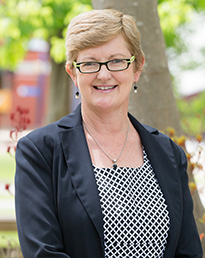 Dear Families,
Dear Families,
In our staff conversations we have been spending time positioning play in our ELC. We agreed that it was a word that constructed many different perceptions from adults. We decided it was important to position play in our centre – where does it sit and do we have a shared understanding about the value of play? We all agree that play is of the upmost importance in a child’s life, it is in fact a right for all children to play (United Nations Rights of the Child). It has a significant role in the development of the human brain as it builds and strengthens brain pathways. We have been reflecting on how much actual unhindered play children have, by that I mean play without it being controlled by the adults.
We then began examining what we learn about children through their play and what they learn from their play. We realised this list was extensive, through play children are learning about life! Play is creative, experimental, intrinsically driven – it is children practicing and exploring life and so much more. We aligned our thinking about agency enhancing wellbeing with agency in play. Our conversation then took us in a direction of when play is not fun and this is when children are being controlled by others, they go along with it because they don’t have the skills to stand up for themselves. So, when should adults be involved in children’s play? What is our role?
All of these critical questions provided us with the opportunity to analyse play across the centre, the importance of it, our shared thinking around why it is so critical and the allocation of time we give to it. Driven by inquiry learning we are providing many opportunities for children to work in small groups. We are constructing the best environments for learning with specific goals in mind. We do however need to stand back at times and see how the skills children bring to these intentional learning experiences translate into free play time. As we promote agency, having a voice, risk taking and choice we are aware of the importance of our role as adults. If we don’t provide children with the chance to transfer their skills between settings, we are not allowing them to experiment with their own skill set.
Our reflecting point entering into our new week was how do we achieve authentic play in an adult constructed environment? How do our children manipulate their environments to enhance their play? We will be observing closely and ensuring we are honouring children’s right to play and advocating for it as we articulate the importance of play in our fast changing world. We hope that play does not take the back seat in your children’s lives and that it does not get misinterpreted as not learning.
Kate Mount
Director of Early Learning
Important Term Dates
Tuesday 13 June: Mid-Year Reception Visit
Sunday 18 June: Ladies Day Out
Monday 26 June: ELC Hat Ceremony, 12.15pm
Friday 30 June: Term 2 Concludes
Monday 3 – 24 July: ELC Vacation Care
Tuesday 25 July: Term 3 Commences
Have you booked your ticket yet? Don’t miss out!
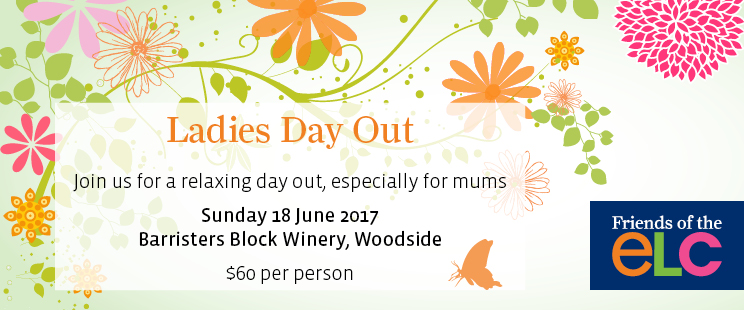
Places are limited so please don’t delay in securing your spot
We are always excited to celebrate and embrace opportunities to bring our community together and our Ladies Day Out is one of these events.
Join us for a relaxing day out, especially for mums at Barristers Block Winery on Sunday 18 June 2017.
Tickets are $60 per person; this includes a glass of bubbles on arrival, platters and pizza for lunch, and a bus to and from the venue. Drinks can be purchased on the day.
Tickets can be purchased at http://www.trybooking.com/PILD
We hope to see you at this special event.
Vacation Care

July holidays
We are now commencing bookings for the July Vacation Care Program. It is available for all current ELC families including families who are leaving us in the middle of the year. Please complete your form and return it as soon as possible.
ELC July Vacation Care Program booking form
A letter from Miss Qian
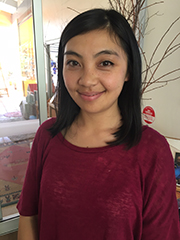 女士外出日
女士外出日
快来参加我们为您特别准备的愉快放松的外出日吧,尤其是妈妈们!
时间:2017年6月18日 星期天
地点: Barristers Block Winery, Woodside
费用:$60/人
费用包含到达时一杯气泡酒+披萨和小吃拼盘午餐+往返车费,如另有需要酒水可自费享用,届时可统一乘坐圣彼得女校校车前往,校车11点从学校出发,下午4点返回学校。
报名订票网址:www.trybooking.com/pild
News from the Stonyfell Room
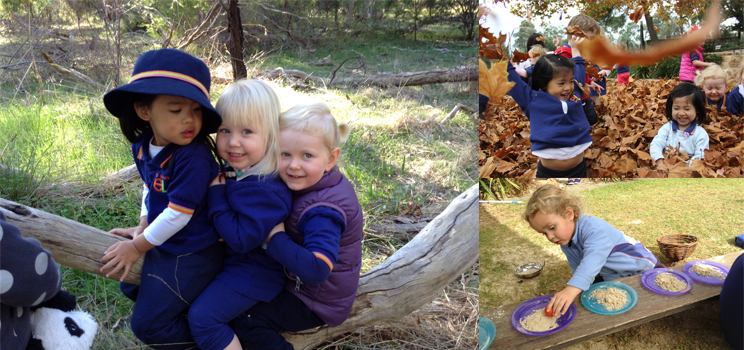
The role of play in our learning environment
“We are never more fully alive, more completely ourselves, or more deeply engrossed in anything that when we are playing.”
Charles Schaefer
Many parents often ask their children this question, “What did you do today at ELC?”
The most common answer is that we played all day! The role of play in your child’s development is pivotal. Some of the benefits are:
• developing problem-solving
• persistence
• practicing social skills
• supporting language development
• fostering creativity.
Play is considered an important part of our day in the Stonyfell Room and we as the educators are constantly considering how and when play fits into our routine and planning. We believe that it is important to provide a balance between small group experiences and allowing children to play freely. During times of play we are able to observe the children and see the skills and ideas they are developing. Children use play as a way to make sense of their world and it is through us observing and analysing play that we can see the areas where we may need to offer more support.
Our PYP curriculum also allows us to have a specific focus on developing certain skills. This term we are concentrating on our communication skills. This gives us as the educators the platform to extend on the children’s verbal and non-verbal communication skills and we can do this through times of play. This may be by actively involving ourselves in play with the children and modelling certain skills or it could be done as we position ourselves outside of the play and act more as a guide to scaffold the language the children may need to further extend their play.
Please feel free to talk to the educators about the value of play in the Stonyfell Room.
Laura Reiters
New myLink Parent Portal
St Peter’s Girls’ School recently launched myLink, the new Parent Portal, giving you a special window into life at the ELC. There’s a host of great features and vital information including notices, inquiry overviews, investigations that are happening in the room, documents and much more. You can also view your child’s ePortfolios via the portal.
Some frequently asked questions from our support session last week were:
How can I access my child’s homepage through the portal?
Click the MYLINK HOME tab on the top menu to take you to your child’s profile. On the right-hand side of that page, click on the link for your child’s room (see Stonyfell Room example below).

It will take you to a homepage with various options:
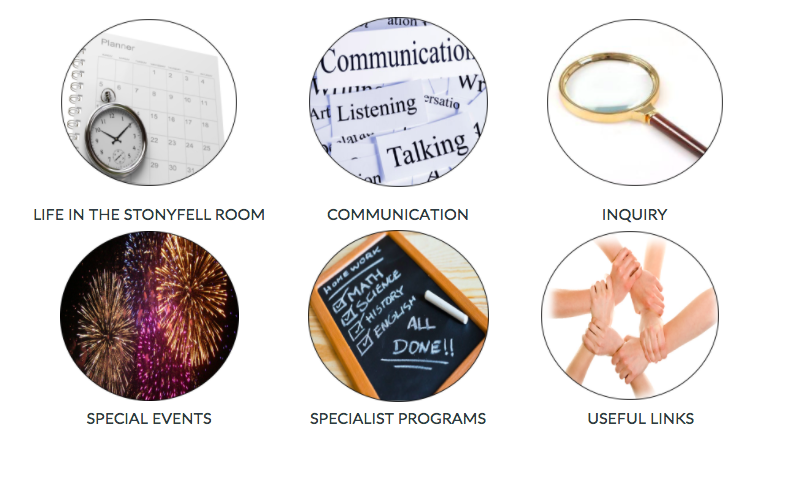 How often are the homepages uploaded?
How often are the homepages uploaded?
The teachers aim to update the homepages regularly, sharing information about the inquiry investigations that are occurring with the rooms. We are currently experimenting with the uploading of videos and different ways of sharing the learning that your child is a part of during their time at the ELC.
How can I access my child’s ePortfolio?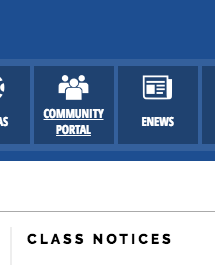
Access ePortfolios by clicking the Community
Portal tab on the top menu, then select the Documentation tab.
The link for the Parent Portal is:
https://mylink.stpetersgirls.sa.edu.au
You should have already been supplied with username and password instructions but if you have any difficulties, contact our IT Helpdesk on helpdesk@stpetersgirls.sa.edu.au or 8334 2227. Support will also be offered in the ELC foyer on Thursday 8, Wednesday 14 and Friday 16 June in the mornings from 7.45 – 8.45am. A member of the IT team will be available to help with technical difficulties, search for your username and reset your password if required. I will be there to show you what the homepage and ePortfolios look like and the information that you can find when you click on the buttons provided.
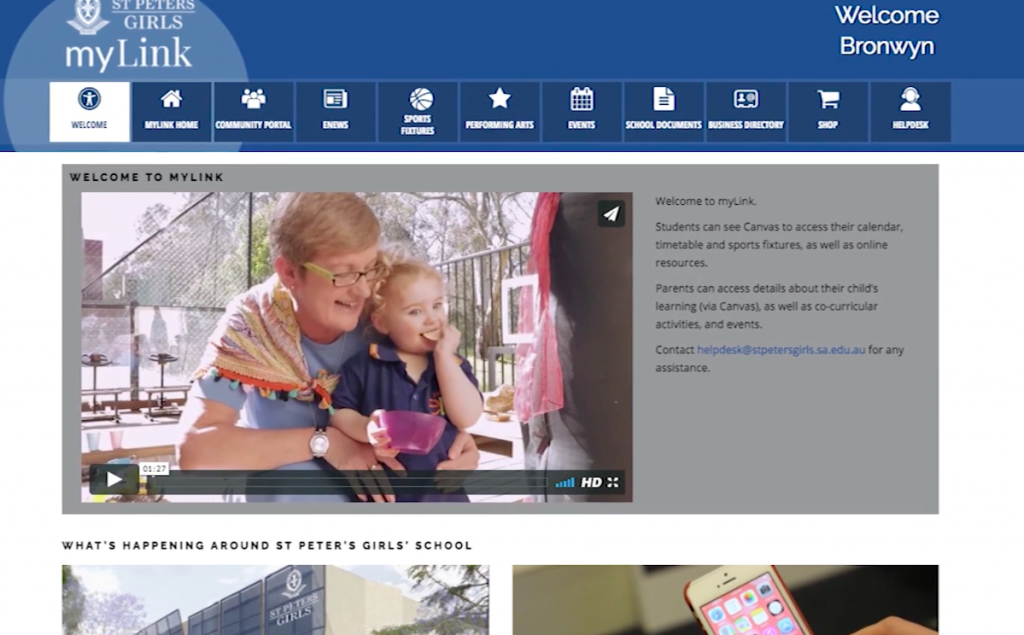
Kirsty Porplycia
User guide videos are available on the Welcome page, including this one specifically for ELC parents:
News from the Bell Yett Room
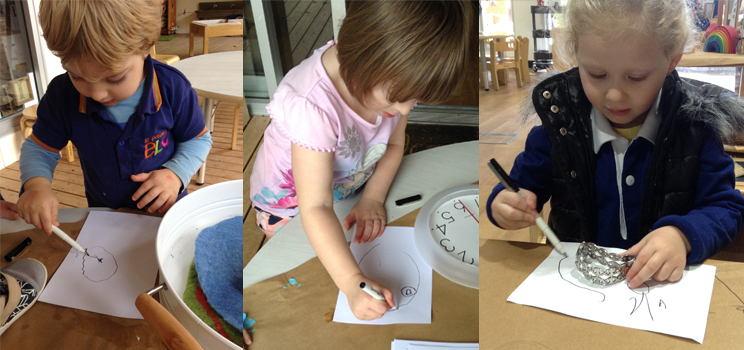
One of the joys of learning alongside young children is the opportunity to engage with them in a wide variety of experiences. On any one day we might have the privilege of being guest of honour at a tea party, painting masterpieces alongside a group of friends, assisting in building a dinosaur with blocks and delighting in the wonder of a pile of autumn leaves. We aim to provide environments that are provocative, open-ended, rich in possibilities and have meaningful connections to each other.
With our inquiry, identity is shaped over time. As our foundation, we have invited the children to engage in many varied but connected learning opportunities. From our previous newsletters you would be familiar with the books the children are creating. We are constantly seeking new ways we can support the children in expressing their identity and documenting this within their personal books. Please feel free to share your child’s book with them. This is an ongoing project and the children are building up their story over the term.
This week we have been sharing another story as we have acknowledged Reconciliation Week with the children. We are fortunate to have an age-appropriate book that sensitively explains the impact of the settlement of Australia on the Aboriginal people. We will continue to explore the Aboriginal culture in both a historical and modern-day context.
The children have enjoyed investigating the clocks and watches we have provided. These explorations have enabled us to discover the children’s prior knowledge of the concept of time. We have begun documenting these understandings on your child’s ePortfolio so please log in to the new myLink Parent Portal and have a read. Moving forward, we are beginning to look for patterns in our daily lives, compare and order events and use past, present and future tenses.
We hope you have had a chance to look at our Bell Yett portal page which provides more information on our days in the Bell Yett Room.
Leanne Williams and Nell Tierney
News from the Ferguson Room
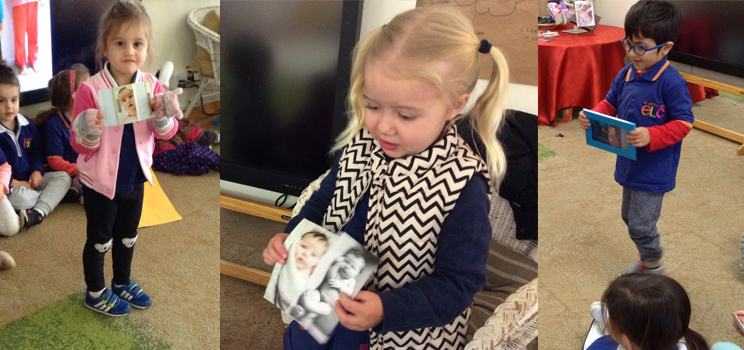
‘Identity can be shaped over time’ – PYP Central Idea
The children have been exploring this idea as they share their photos of when they were babies. The sharing they have been doing at Morning Meeting has been significant for a number of reasons. It has fostered their communication skills, which is our PYP skill focus this term. This has further deepened their connections to each other, and we hope it has cultivated their insights and empathy towards one another. It has demonstrated to us how confident they are in revealing who they are to our group. They feel safe in the knowledge that they are valued as individuals, and this is evidence of the work we have been doing all year to promote an empathetic, respectful group. Sharing at Morning Meeting and at other group times during the day is the children’s first foray into public speaking, a skill that will always be an important one throughout their lives. We are so proud of the courage and confidence they have been demonstrating. Here are some of their words we have been privileged to hear.
“This is me in a little seat in the bath with my toy frog. I can do somersaults and headstands now.” Delilah
“I had a special tube that put food in my belly when I was little.” Edwina
“This is me when I was a baby. I was so cute. I had a little head. Now I am a big girl.” Josie
“I can draw now. I can eat. I can eat grown up food.” Poppy
“Millie was first, then it was me.” Ivy Wright
“I had no hair when I was a baby. I was playing with my octopus toy in this picture. I gave it to Foss. I like to play with big girl stuff now.” Winnie
“She likes to play with interesting stuff now.” Elsie
“I was all wrapped up in Mummy’s bed. My brother and sister were born before me.” Colette
“Colette was a little different and small then.” Jacob
“When I was a baby Mummy fed me with a pink spoon but I pushed it away.” Hannah
“I was the first one, then Tommy. I’ve got another baby now. And I can draw now.” Eliza
“When I was little I hurt my finger. I have a big bandage on my finger.” Harrison
Thank you for supporting the children’s learning, confidence and storytelling by sending in their photos.
Mel Angel
News from the Hallett Room
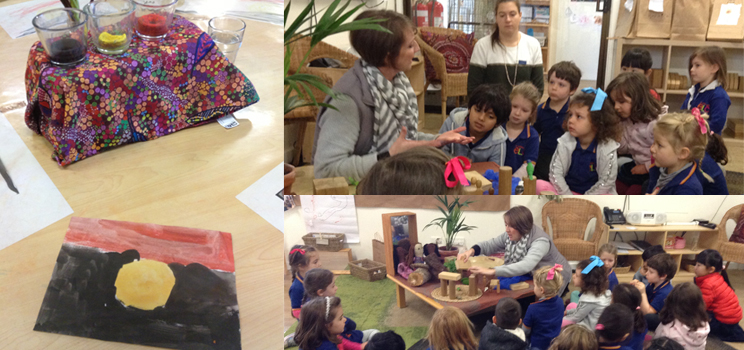
“Stories make us more alive, more human, more courageous, more loving” – Madeleine L’Engle
What a better way to include Reconciliation Week into our inquiry than to use it as an example of a story. Something that informs us about the past, our present and the future. The children have been captivated by the story, demonstrating their sense of justice.
“That’s not fair.”
“They should have shared.”
“It was the Aboriginal people’s first!”
Reconciliation is about promoting equality and recognition across cultures. It is our responsibility as educators to introduce our Indigenous culture to our children, providing them with a greater understanding of Aboriginal and Torres Strait Islander ways of knowing and being (EYLF).
Reconciliation Week is framed by two key events in Australia’s history which provide strong symbols of the aspirations for reconciliation.
27 May: the anniversary of Australia’s most successful referendum that saw 90% of Australians vote to give the Commonwealth the power to make laws for Aboriginal and Torres Strait Islander peopled and recognise them in the national census.
3 June: Mabo Day. The decision by the High Court of Australia which legally recognised that Indigenous people had a special relationship with the land that existed prior to colonisation and still exists today. This recognition paved the way for Indigenous land rights called Native Title.
As we examine the art of storytelling, the children are developing key communication skills. Through their interest and curiosity in the stories shared they have showed their ability to listen with intent. To truly listen to a story, results in a strong connection to it – where you feel it.
“I cried a little bit at the end of the story because I was so happy.” Sophie Blake
They are making sense of a situation – but also creating a new ending.
‘Now we share and look after the land together.’
‘My family are from India and we are here, too.’
As we use Reconciliation Week as part of our ongoing inclusion of Aboriginal culture, we can see children making sense of their world and developing an understanding about what it means to be Australian. Our Acknowledgement of Country is a wonderful way to think about our gratitude for the land we all enjoy each day.
Pam Reid
